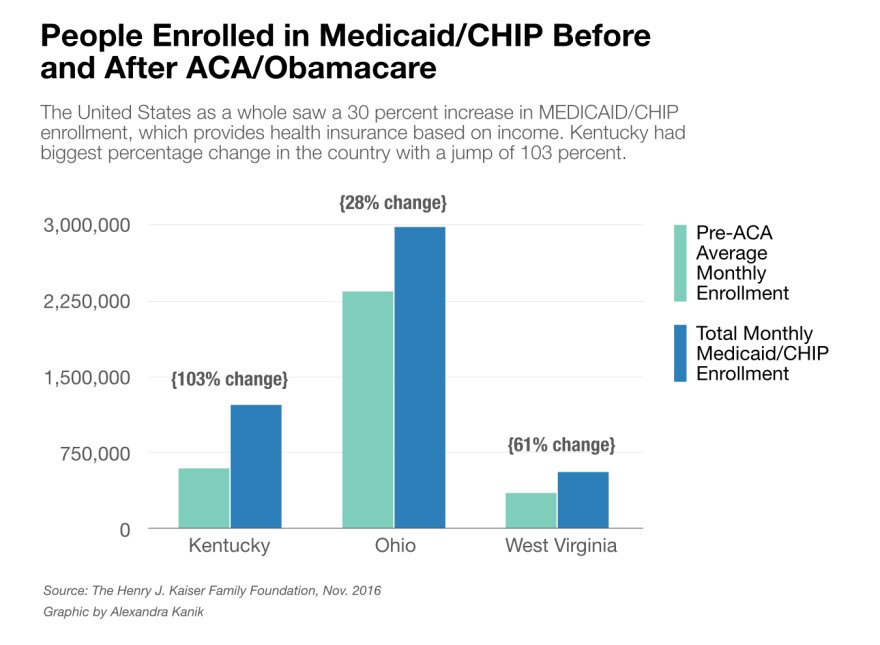Republican Senate Majority Leader Mitch McConnell went to the western Kentucky city of Paducah this week to talk about improvements to a local flood wall. Outside, more than 30 protesters led a flood of complaints about the Senate bill to repeal and replace the Affordable Care Act.
“We will not go away, don’t destroy the ACA!” the protesters chanted, and relayed their concerns about the Senate bill’s projected cuts.
McConnell’s not alone. Across the Ohio Valley, lawmakers returning from Washington during the July Fourth recess find themselves on the hot seat over health care. Sit-ins, petition drives and other protests are taking place at Senators’ regional offices and local events, even in some places that are deep-red politically.

Grassroots Resistance
Multiple citizens’ groups in the region have been pushing back against proposed health care changes.
In Kentucky, Indivisible Bluegrass, The People’s Campaign, and Together We Will Bluegrass have all used social media to organize events targeting McConnell and Kentucky Rep. Andy Barr. A sit-in, hosted by Our Revolution Central Kentucky is planned for McConnell’s Lexington office Friday along with another protest at McConnell’s office in Glasgow.
In West Virginia, a group called Rise-Up West Virginia staged a sit-in at Sen. Shelley Moore Capito’s Charleston office before she announced her opposition to the bill. Health care advocates said Capito can expect to see another protest before the end of the Congressional holiday break.
Ohio Sen. Rob Portman faced a similar sit-in protest at his Washington, D.C., office. He’s scheduled a visit to an Ohio drug rehabilitation center to discuss his concerns about funding for addiction treatment.

Kentuckians for the Commonwealth organized the protest and petition drive that greeted McConnell in Paducah.
Leslie McColgin, a speech therapist who works with individuals with disabilities, was among the demonstrators.
“We have moved forward, forward, forward and this law is just going to take us back and take services away from the most vulnerable people,” she said.
McColgin said most of the people she serves rely on Medicaid and she fears that many of the services they receive would be cut.
McConnell said the protesters likely favor a “single payer system — meaning the government would be in charge of everything. I think that’s a big mistake,” he said. “So we have a difference of opinion.”
Medicaid Matters
Protesters have focused on the proposed changes to the ACA’s expansion of health coverage under Medicaid. Kentucky, West Virginia and parts of Ohio have seen some of the country’s biggest increases in people covered via Medicaid, and the number of people lacking insurance has dropped sharply since the ACA’s took effect.
Demonstrator Danielle Fernandez of Murray said she worries that the Senate bill will cut that coverage.
“I work in child care, so even though I work full-time I still need Medicaid,” she said. “And I know a lot of people that are doing that and a lot of people that are working full-time in childcare, teaching that cannot afford insurance on their own.”
McConnell disputed the protesters’ characterization of the bill.
“Nothing — nothing — that we’ve advocated so far would cause anybody currently on Medicaid to be taken off Medicaid,” he said.

“They’re probably talking about the private health insurance market. And when you quit making people buy insurance they don’t want or need a number of people will decide not to do it,” McConnell said.
The forecasters at the Congressional Budget Office predict that the Senate bill would phase out the ACA’s Medicaid expansion and reduce subsidies for health insurance purchased via the individual market. The CBO estimated that would mean that 15 million fewer people would have insurance by 2018. By 2026 that number would climb to 22 million, roughly on par with the CBO projections for the earlier bill passed by the House.
“No” Votes
The protests and their targets highlight the difficult political calculations McConnell faces in trying to get his caucus in line to support the bill. Kentucky Sen. Rand Paul, Ohio Sen. Rob Portman, and West Virginia Sen. Shelley Moore Capito were among the handful of Republicans who indicated they would vote against the health care bill.
But the opposition stems from very different critiques of Senate bill.
Paul, a small-government libertarian, has argued that the measure does not go far enough to dismantle Obamacare or rein in rising health care costs. Portman and Capito have both voiced concerns about effects of changes to Medicaid coverage and implications for treatment available to fight the region’s opioid crisis.
If McConnell adds elements to appeal to Portman and Capito, he risks further alienating Paul and other critics of government spending.
Meanwhile, as Republicans dodge protests, Congressional Democrats are working to highlight the bill’s proposed cuts. Kentucky Rep. John Yarmuth, who represents Louisville, plans a town hall meeting on the issue over the weekend.





